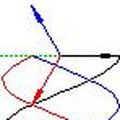 @Nick Rehm couldn't you just use some form of current sensing? You know the current pretty well and also the shape of the conductor
@Nick Rehm couldn't you just use some form of current sensing? You know the current pretty well and also the shape of the conductor
 @Joe Stavitsky I actually don't know of too many opensource software options for rotor design. Most stuff I've worked with was proprietary/in-house. Simple momentum analysis can get you a surprisingly long way though
@Joe Stavitsky I actually don't know of too many opensource software options for rotor design. Most stuff I've worked with was proprietary/in-house. Simple momentum analysis can get you a surprisingly long way though
![]() @pascal.fust Yup. Homogenous, no fusing lines, 100% fill factor. Heard something about increase of fracture toughness by graphene or nanotubes.
@pascal.fust Yup. Homogenous, no fusing lines, 100% fill factor. Heard something about increase of fracture toughness by graphene or nanotubes.
 @Nick Rehm So you have used commercial software? Which did you like?
@Nick Rehm So you have used commercial software? Which did you like?
 One option for "3D Printed" rotors I've been thinking about is just using the 3d print as a mold for a cast epoxy/glass final product
One option for "3D Printed" rotors I've been thinking about is just using the 3d print as a mold for a cast epoxy/glass final product
 I mean, who really cares about durability of 3d prints? At that price, the fragility is kind of the point. As long as it lasts the entire flight, and collisions will ground you no matter what your rotors are made of
I mean, who really cares about durability of 3d prints? At that price, the fragility is kind of the point. As long as it lasts the entire flight, and collisions will ground you no matter what your rotors are made of
 @Nick Rehm also, do you recommend any kind of "wind tunnel arrangement" to test propellers, to control for temperature, humidity, etc?
@Nick Rehm also, do you recommend any kind of "wind tunnel arrangement" to test propellers, to control for temperature, humidity, etc?
 Casting forfeits the advantage of being able to place infill where it's needed for strength but otherwise conserve lightness, which I think is a big deal in 3DP. Just need that second extruder with a carbon fiber strand that it can smush into the still-warm top layer before extruding more plastic over it ;)
Casting forfeits the advantage of being able to place infill where it's needed for strength but otherwise conserve lightness, which I think is a big deal in 3DP. Just need that second extruder with a carbon fiber strand that it can smush into the still-warm top layer before extruding more plastic over it ;)
![]() @Thomas Shaddack I mean, we are talking about tip speeds of 200-300km/h or more, depending on the design
@Thomas Shaddack I mean, we are talking about tip speeds of 200-300km/h or more, depending on the design
 If it's big enough, could even print out a channel to slot in a carbon spar after the fact. I've done that with tiny LW-PLA blades with a 2mm carbon spar
If it's big enough, could even print out a channel to slot in a carbon spar after the fact. I've done that with tiny LW-PLA blades with a 2mm carbon spar
 Yea I guess the big question is how big of a rotor are we talking?
Yea I guess the big question is how big of a rotor are we talking?
 Yeah, for land-based stuff I print 1/4-20-threaded hollows in a lot of my larger parts and add some all-thread when it's done printing. Something like that for CF tube would make a lot of sense.
Yeah, for land-based stuff I print 1/4-20-threaded hollows in a lot of my larger parts and add some all-thread when it's done printing. Something like that for CF tube would make a lot of sense.
![]() I think that size does not really matter as smaller size implies higher rotation speed, resulting in higher forces
I think that size does not really matter as smaller size implies higher rotation speed, resulting in higher forces
 @Joe Stavitsky re: wind tunnels: just be sure to keep your reynolds number constant
@Joe Stavitsky re: wind tunnels: just be sure to keep your reynolds number constant
 Fc = mv^2/r
Fc = mv^2/r
 @Nick Rehm cool makes total sense
@Nick Rehm cool makes total sense
![]() And, rotational force is only part of the game.... don't talk about about torsion
And, rotational force is only part of the game.... don't talk about about torsion
 Fun fact: only reason heli blades don't break despite being so flimsy is that the centripetal force literally pulls them tight
Fun fact: only reason heli blades don't break despite being so flimsy is that the centripetal force literally pulls them tight
 @Nick Rehm We heart Physics =P
@Nick Rehm We heart Physics =P
 makes sense, also why they wobble so much as they go around their circle
makes sense, also why they wobble so much as they go around their circle

https://youtu.be/3-Kr3I_nNCs?t=40
 lol
lol
 oh now I'm gonna have the Airwolf theme in my head
oh now I'm gonna have the Airwolf theme in my head
 Underrated movie
Underrated movie
 Did I miss any questions/topics? Sorry tried my best to keep up. I can hang around for a few more minutes
Did I miss any questions/topics? Sorry tried my best to keep up. I can hang around for a few more minutes
 Are you open to followup contact?
Are you open to followup contact?
![]() Wobble is maybe not a problem, but twisting might destroy the nicest pitch
Wobble is maybe not a problem, but twisting might destroy the nicest pitch
 @Nick Rehm yeah I'd be really stoked if you had time to look at my props once I get started
@Nick Rehm yeah I'd be really stoked if you had time to look at my props once I get started
 Sure, ya'll can email me at nicholasrehmyt@gmail.com. Very happy to nerd out over projects or answer and deep questions about drones/helis/autonomy
Sure, ya'll can email me at nicholasrehmyt@gmail.com. Very happy to nerd out over projects or answer and deep questions about drones/helis/autonomy
![]() @pascal.fust Aeroelasticity for the rescue?
@pascal.fust Aeroelasticity for the rescue?
 Or I guess direct message me here; I don't check hackaday messages as often tho
Or I guess direct message me here; I don't check hackaday messages as often tho
![]() hmmm... if well predicted, it can work out
hmmm... if well predicted, it can work out
 Keep the chord-wise structural center of your blade ahead of the lift center and most twisting problems will go away
Keep the chord-wise structural center of your blade ahead of the lift center and most twisting problems will go away
 Nick Do you know anyone in the public sector dealing with business or contracts?
Nick Do you know anyone in the public sector dealing with business or contracts?
 @Nick Rehm Awesome, tyvm. If you have time I'm sure you'd be welcome at Physics Forums as well, I hang out there a lot and I'm positive they don't have any aerospace people whatsoever
@Nick Rehm Awesome, tyvm. If you have time I'm sure you'd be welcome at Physics Forums as well, I hang out there a lot and I'm positive they don't have any aerospace people whatsoever
![]() good point
good point
 I'd need to dig out my leishman textbook for a refresher before giving better rotor design advice lol
I'd need to dig out my leishman textbook for a refresher before giving better rotor design advice lol
 And look at that -- already 1:00! That was fast - I didn't even get to ask about Ingenuity! I want to thank Nick for his time today, and everyone for the great discussion.
And look at that -- already 1:00! That was fast - I didn't even get to ask about Ingenuity! I want to thank Nick for his time today, and everyone for the great discussion.
 Does that suggest that, when aero quads go inverted and spin their props backwards, the blades themselves are inherently unstable?
Does that suggest that, when aero quads go inverted and spin their props backwards, the blades themselves are inherently unstable?
 Thanks Dan, I'll be here a few more minutes :)
Thanks Dan, I'll be here a few more minutes :)

 Yes, thank you all! Some of us will continue to dribble out ideas indefinitely unless booted out ;)
Yes, thank you all! Some of us will continue to dribble out ideas indefinitely unless booted out ;)
![]() @Nick Rehm I terms of VTOL transition UAVs, which approach would you consider most efficient, the blended wing, or fixed wing?
@Nick Rehm I terms of VTOL transition UAVs, which approach would you consider most efficient, the blended wing, or fixed wing?
 Do you recommend any "seminal texts" on aerospace engineering?
Do you recommend any "seminal texts" on aerospace engineering?
 Don't feel booted, always open here for discussion. Just need to let Nick get back to work if he has to.
Don't feel booted, always open here for discussion. Just need to let Nick get back to work if he has to.
 reverse props: yes but miniquad props are so darn stiff that the torsional frequency is too high to do anything interesting (explosive)
reverse props: yes but miniquad props are so darn stiff that the torsional frequency is too high to do anything interesting (explosive)
 Anderson's intro to aerospace book is a good read
Anderson's intro to aerospace book is a good read
 Thanks
Thanks
 VTOLS: really depends on the integration of the vertical lift propulsion vs. forward flight propulsion. Think: how much is dead weight in forward flight, how much drag does a lifting motor induce in forward flight, can you use a lifting motor as a forward flight motor?
VTOLS: really depends on the integration of the vertical lift propulsion vs. forward flight propulsion. Think: how much is dead weight in forward flight, how much drag does a lifting motor induce in forward flight, can you use a lifting motor as a forward flight motor?
![]() Sure. Thanks for your advice and sharing your knowledge and opinion
Sure. Thanks for your advice and sharing your knowledge and opinion
 Alright y'all, thanks for having me. Don't hesitate to DM or email. I'm not an expert by any means of the word, but I am quite a big nerd who's always excited to help others out :)
Alright y'all, thanks for having me. Don't hesitate to DM or email. I'm not an expert by any means of the word, but I am quite a big nerd who's always excited to help others out :)
 Thanks Nick! And thanks all for the engagement. Transcript to follow
Thanks Nick! And thanks all for the engagement. Transcript to follow
 Dan Maloney
Dan Maloney
Discussions
Become a Hackaday.io Member
Create an account to leave a comment. Already have an account? Log In.